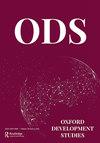军事独裁和提供公共产品
IF 1.2
Q3 DEVELOPMENT STUDIES
引用次数: 0
摘要
摘要非民主国家,特别是独裁国家,与民主国家相比,提供地方公共产品的方式不同。我们利用1947年印度次大陆的分治来研究生活在相似农业气候条件下的相似种族群体在面临不同治理制度时如何获得截然不同的公共产品配置。我们的方法借鉴了巴基斯坦中央政权在民选政府和军事独裁之间的转变,同时以印度为基准,印度自始至终都有民主政府。我们创建并利用了一个新的数据集,用于印度和巴基斯坦各轮人口普查的地区级分析。我们的回归结果一致表明,在独裁统治下,各种公共产品的供应严重不足,同时控制了一系列时变的局部因素。我们的结果经受住了一系列稳健性检查,尤其是不受大城市或特定省份的影响。本文章由计算机程序翻译,如有差异,请以英文原文为准。
Military dictatorship and the provision of public goods
ABSTRACT Non-democracies, particularly dictatorships, provide local public goods differently when compared to democracies. We use the Partition of the Indian sub-continent in 1947 to examine how similar ethnic groups living in similar agro-climatic conditions obtain substantially different configurations of public goods when exposed to different governance regimes. Our methodology draws upon the shifts in the central regime in Pakistan, between popularly elected governments and military dictatorships while using India as a benchmark, which had democratic governments throughout. We create and utilize a novel dataset for our district-level analyses from various census rounds in India and Pakistan. Our regression results consistently show that there is a significant under-provision of various public goods under dictatorships, while controlling for a host of time-varying local factors. Our results survive a battery of robustness checks and are particularly, not driven by large cities, or specific provinces.
求助全文
通过发布文献求助,成功后即可免费获取论文全文。
去求助
来源期刊

Oxford Development Studies
DEVELOPMENT STUDIES-
CiteScore
2.70
自引率
0.00%
发文量
20
期刊介绍:
Oxford Development Studies is a multidisciplinary academic journal aimed at the student, research and policy-making community, which provides a forum for rigorous and critical analysis of conventional theories and policy issues in all aspects of development, and aims to contribute to new approaches. It covers a number of disciplines related to development, including economics, history, politics, anthropology and sociology, and will publish quantitative papers as well as surveys of literature.
 求助内容:
求助内容: 应助结果提醒方式:
应助结果提醒方式:


